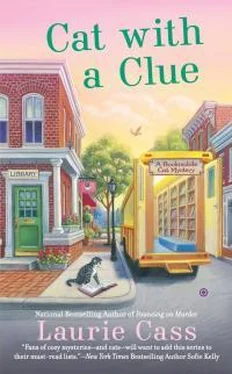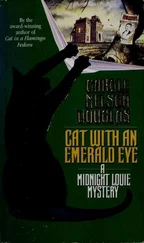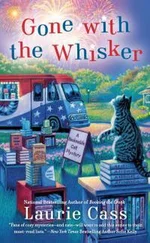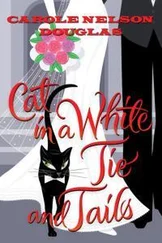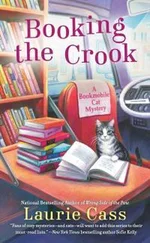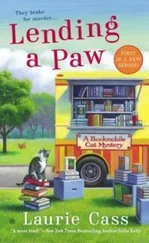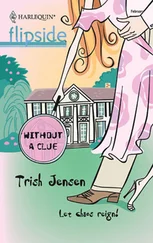“Mrr.”
I whipped around and spotlighted my cat. “Eddie! You get off Eric’s boat this minute!”
Since he was a cat, he didn’t pay attention to a word I said, but instead sat down on the boat’s edge, a little sideways, and started licking his back paw. “Nice,” I said, stepping onto the dock. “They say cats are elegant creatures. What happened to you? Oh, that’s right. You’re not exactly a cat, are you? You’re a different species entirely. I’m almost sorry I had you fixed. I could have made all sorts of money putting you out for stud. Tens of dollars, I’m sure. Not all at once, but as a total, I can definitely see it.”
My babble covered the noise of my soft footsteps, and as soon as I got close enough, I reached out and pulled Eddie into my arms.
“You are a horrible cat,” I told the annoying animal, who was already purring. “Jumping over to the neighbor’s, acting as if you belonged. You probably hoped Eric would be there, ready to hand out treats and—”
I stopped in the middle of the dock, my words forever lost.
Because I suddenly knew, flat-out knew, what had happened to the DeKeysers’ copy of Wildflowers .
Chapter 16
The next morning, I wasn’t so sure.
Yes, maybe Talia DeKeyser, in her last months of living in the family home, had given away a book about flowers to the little girl next door who had a penchant for picking the things, but what proof did I have?
None whatsoever.
And how seriously would Detective Inwood take this if I toddled down to the sheriff’s office and insisted on talking to him face-to-face since he hadn’t yet bothered to return my phone call?
Not at all.
Which meant that instead of turning my suspicions over to Inwood or Ash, who also hadn’t called back, I flexed my research muscles—I am librarian, hear me type into a search engine!—and thanks to the parcel-search function on the county’s Web site, within minutes, I’d tracked down the name and mailing address of the people who owned the property next to the DeKeysers.
“Nathan and Chandra Wunsch,” I said out loud. The last name wasn’t familiar and it was too early to call my local sources. It wasn’t even eight o’clock; Kristen would be sleeping for another hour, as would Rafe, who slept deep and late the couple of weeks after school was done for the summer. It was tempting to call Rafe anyway, just to annoy him, but he’d be groggy and uncooperative, and any information he gave me would be suspect.
So I pulled the phone book out of the back of my bottom drawer and flipped through the flimsy pages. The names went from Wunderlich to Wyant, no Wunsch in sight. No landline, then.
I looked up and down the column of small print, hoping that maybe the phone book people had made an alphabetizing mistake, but saw nothing helpful.
After uttering a short curse, I tossed the book into the spot from whence it came. Lunch. I’d walk over to the Wunsches’ house during lunch.
* * *
It didn’t happen, of course. By the time I caught up on e-mails, the phone calls started, and by the time I finished with those, there were more e-mails to answer. Lunch came, and only the fact that Donna called back to ask if I wanted an order from the Round Table kept me from going hungry.
It was midafternoon by the time I’d taken care of the library’s immediate needs. I got up, stretched, and, since it was in the neighborhood of the traditional three-o’clock break time, I grabbed my coffee mug and headed for the break room. Huddled together at the table were Holly, Josh, and Kelsey.
I was about to make a comment about an unholy triumvirate when Holly whirled around. “Oh, it’s you,” she said.
This was a little deflating, and I was about to say so, but Josh spoke first.
“If they hire a jerk, it’ll be your fault.”
I blinked at the fierceness of his tone. “‘They’ being who, exactly?”
Holly blew out an exasperated sigh. “The library board, doofus. If we end up with that Jennifer Walker as our boss, I’m dead meat. She hated me on sight—I could see it.”
I frowned, not remembering if Jennifer had been the one Eddie had deposited his stomach contents onto, or if she’d been the one I hadn’t met due to being out on the bookmobile. “What was Jennifer like?”
“She was wearing city clothes,” Kelsey said. “All sleek and shiny.”
The one who’d been Eddified.
Josh got up and started making a pot of decaf. “And if they hire Theodore, I’m giving my two weeks’ notice. No way am I going to work for some guy who thinks he knows everything about IT. He was giving me pointers on how to store data on the cloud. Did I ask for advice? No. But he wanted to give it, so I had to listen.”
My coworkers continued to vent their anxieties, ranging from Josh’s concern that a new director wouldn’t want to fund his full-time IT position, to Holly’s fear that a new boss would move everybody to part-time, to Kelsey’s worry that the most recent hires would be considered unnecessary.
As they talked, I recognized a common theme: all three were afraid of change. It was natural and to be expected, and it was why they’d wanted me to apply for the position. But change was inevitable, and they had to be prepared.
When I told them as much, I received a universally sour expression.
“Don’t want to,” Josh said.
“We wouldn’t have to change if you’d applied,” Holly added.
“Just think,” Kelsey said morosely. “The next director might be worse than Stephen.”
And with that encouraging sentiment ringing in my ears, I headed back to my office.
* * *
Hours later, I walked up the steps to the front porch of the house owned by Nathan and Chandra Wunsch. The porch floor’s wooden boards had been replaced by composite, one of those materials that didn’t have to be painted and wouldn’t need to be replaced for a thousand years.
Rafe railed against the stuff being installed on period homes, saying it was nothing but plastic, that if you didn’t have time to take care of real wood then you shouldn’t buy a period house in the first place. He had a point, but he was so emphatic about it that I’d been compelled to poke at him with a sharp-ended conversational stick. “Okay, but don’t people have the right to do what they want with their own house?”
“Not if what they want to do is stupid,” he’d said.
This had sent us into a long debate about who got to decide what was stupid—Rafe saying that he should be the ultimate arbiter of any stupidity issue, me saying that no man who ever climbed an extension ladder carrying a sixteen-inch chainsaw should be able to judge someone’s stupidity level—and we’d ended up playing rock, paper, scissors for the final decision. He’d tried to cheat, of course, by using the world-destroying-meteor option to win, something I’d banned from the game the year before, so we’d called it a draw.
Remembering all that, I was smiling when I used the lion’s-head knocker to rap on the front door.
It opened immediately, and the little girl I’d seen playing in the garden a few nights before looked up at me. She pushed her long sandy blond hair back behind her ears and said, “I saw someone on the porch and my mommy told me to answer the door. She’s in the kitchen stirring something.”
“Macey?” her mother called. “Who is it?”
The girl squinted at me, then over her shoulder, yelled, “I’m not sure!”
It was so like what I would have done at her age that I almost laughed out loud. “Here,” I said, digging into my backpack for a business card. “Take this to your mommy.”
“Okay.” Macey left me standing in the doorway and scampered back to the kitchen.
There was a murmur of voices, the rattle of pots and pans, and a woman a few years older than me, with hair even curlier than mine, came out of the kitchen and through the living room, drying her hands on a small towel as she walked. “Hi,” she said. “I’m Chandra Wunsch. Sorry, but we don’t get to the library much.”
Читать дальше
